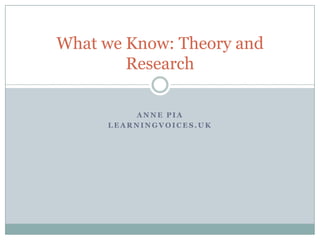Conference Final Presentation
•Download as PPTX, PDF•
0 likes•246 views
What we Know about teaching that works
Report
Share
Report
Share

Recommended
Recommended
Private speech use in the collaboration between EFL learners

Private speech use in the collaboration between EFL learnersFederal University of Rio Grande do Sul (UFRGS)
More Related Content
Similar to Conference Final Presentation
Private speech use in the collaboration between EFL learners

Private speech use in the collaboration between EFL learnersFederal University of Rio Grande do Sul (UFRGS)
Similar to Conference Final Presentation (20)
teaching_everyday_practice_communities_of_practice

teaching_everyday_practice_communities_of_practice
Hanadi Khadawardi - What’s the problem? L2 Learner’s Use of the L1 During

Hanadi Khadawardi - What’s the problem? L2 Learner’s Use of the L1 During
Private speech use in the collaboration between EFL learners

Private speech use in the collaboration between EFL learners
Learning from cognitive development to identity development

Learning from cognitive development to identity development
Language Motivation: From the Theoretical to the Practical

Language Motivation: From the Theoretical to the Practical
Students as Partners Project - Conference Presentation

Students as Partners Project - Conference Presentation
EUROCALL Teacher Education SIG Workshop 2010 Presentation Vicky Antoniadou

EUROCALL Teacher Education SIG Workshop 2010 Presentation Vicky Antoniadou
Teaching for Peace, Renewing the Spirit - TESOL 2014

Teaching for Peace, Renewing the Spirit - TESOL 2014
Conference Final Presentation
- 1. Anne Pia Learningvoices.uk What we Know: Theory and Research
- 2. What we Know: the theory Learning settings - complex, volatile environments of dynamic change Potential for change is dependant on certain factors being present Revisiting Vygotsky (1961, 1978) and the zone of proximal development, stressing dialogue and co-construction of knowledge
- 3. What we Know: the Theory Enculturation in classrooms (Bourdieu,1977,1984; Lave and Wenger,1991) Power relations in classrooms (Foucault,1985; Aronowitz and Giroux,1985) The prime importance of other as a dynamic for change (Wenger,1998; Marková, 2004)) The unsettling issue of identity and the impact on it by the social settings of classrooms (Gallacher, 2002,2006; Holland, 1998, 2001)
- 4. What we Know: the Theory Power of dialogue – dialogue as embodiment of self, dialogue as voices of the mind (Mercer, 2002; Alexander, 2004) Importance of emotion, instinct, sensing and non-verbal communication (Heron, 1996; Heron &Reason, 1997).
- 5. Conclusions from the Theory Engaging classrooms: give space for the self provide flexibility for growth promote collaborative learning and knowledge construction
- 7. Learners at UWS Their journey Learning literature Reflection on past experiences Reflection on what motivated them to learn Undertook action research looking at the impact of class groupings, dialogue, knowledge transmission and knowledge-making as learning strategies Looked very closely at the impact learners can have on learning strategies and the learning setting
- 8. Introducing the Presentations Group 1: Aileen Ellis, Janice McVey, AbduljafarAhmadu, OkitikpiOghenerukevwe Group 2: MariebethKosky, Lisa Milner-Smith, OlatubosunOdukomaiya, Chris Moore Group 3: Geraldine Clark, John Canning, Claire Lumsden
- 9. Anne Pia Learningvoices.uk What we Know: Theory and Research